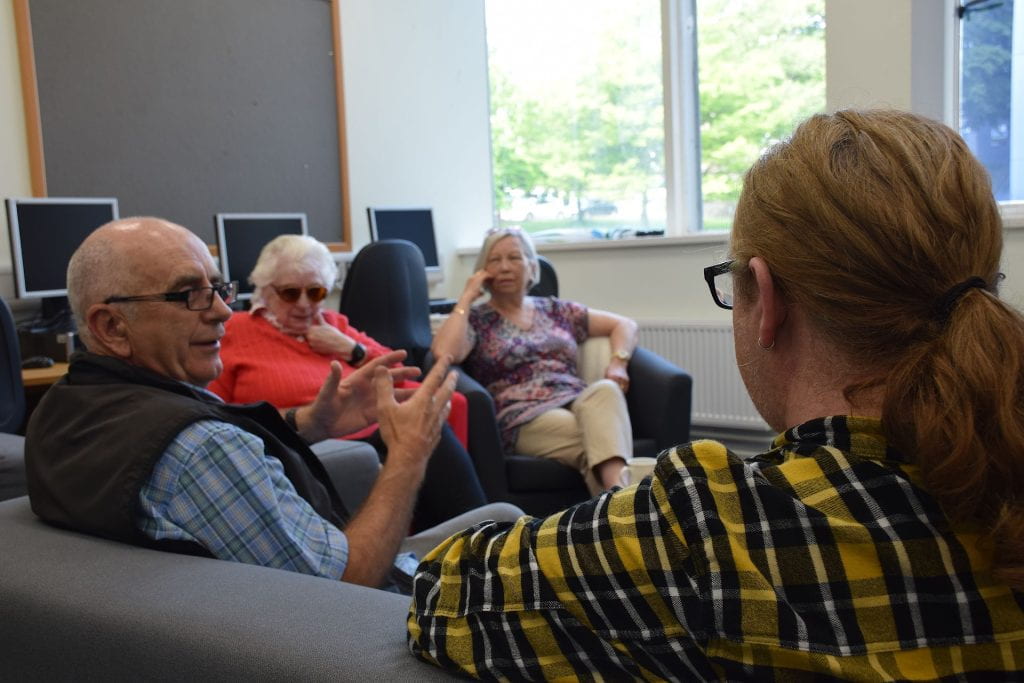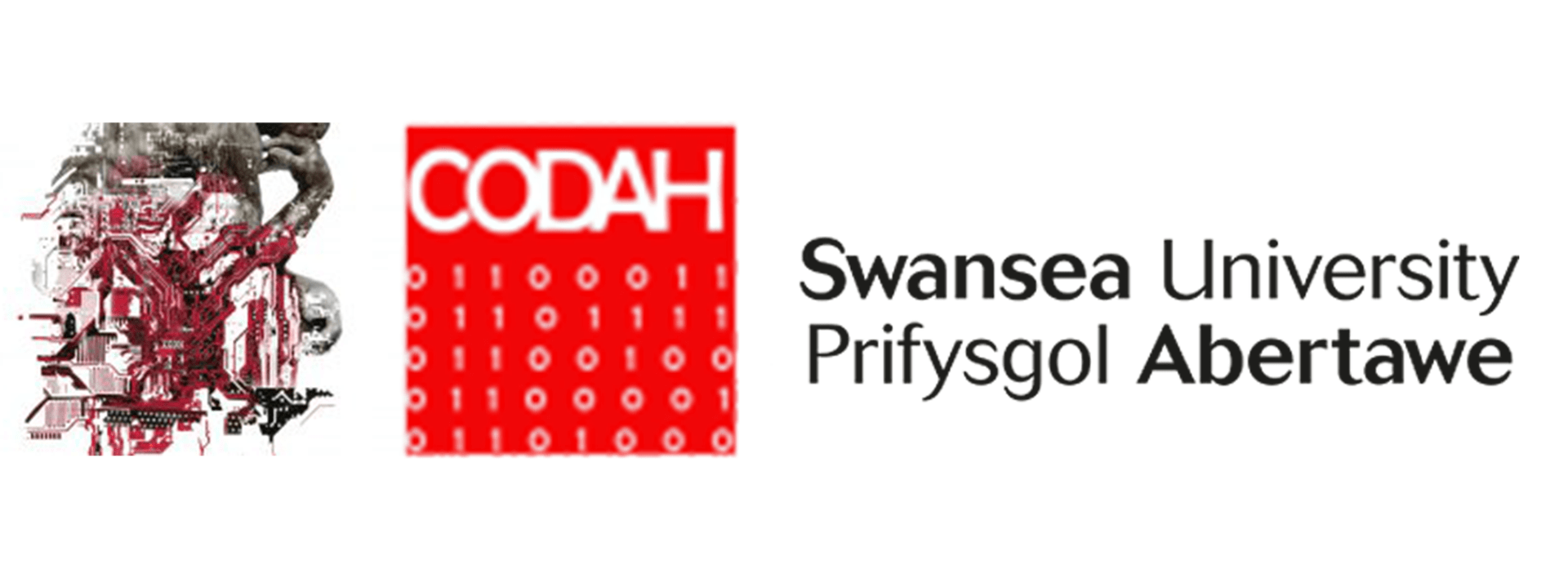- CODAH Symposium 2025 – Truth and Trust in a Digital Age: Exploring Regulation, Education and Knowledge
- CODAH AI Symposium 2024 – amendments to programme
- IEEE Editor in Chief Appointed
- Lyons and the Emergence of Business Computing
- CODAH Symposium 2024 – AI Horizons: Navigating the Intersection of Artificial Intelligence and the Humanities.

Centre of Digital Arts and Humanities at Swansea University
The Centre of Digital Arts and Humanities (CODAH) is a research centre based at Swansea University supporting and facilitating interdisciplinary research across colleges and departments.
CODAH makes use of innovative digital tools and methods for investigating different forms of text, data and media, creating interaction between scholars across the humanities and social science disciplines.
Over the past years, CODAH has supported various funded projects that transform policy, heritage, people, and practices. Select current projects in Heritage & History, Literature, Linguistics, Political & Social Sciences, Media & Communication, and Human-Computer Interaction:
Board
CODAH is currently under the directorship of Dr Leighton Evans (Media & Communication), and supported by its academic board consisting of the following members from different research areas:
- Mr Alexander L. Roberts (Administrative support, ISS)
- Ms Billie-Jo Matthews (Media, Postgraduate Lead and Deputy Director)
- Dr Yan Wu (Media)
- Dr Troy Astarte (Computer Science)
- Ms Eve Moriarty (Digital Humanities)
- Mr Ryan Lloyd (Digital Humanities)
Current and Past Projects
Select current projects in Heritage & History, Literature, Linguistics, Political & Social Sciences, Media & Communication, and Future Media / Human-Computer Interaction:
Heritage & History
- Welsh Copper – Alex Langlands, Stuart Griffin, and other members of the Heritage team have ongoing interests in new modes of heritage site visitor interaction at the Hafod Morfa Coppeworks site, and more generally as part of the industrial heritage of the Lower Swansea Valley
- History of Computing Collection: John Tucker (Computer Science) and Steve Williams (Library) have set up this collection to chart the development of computing and its impact, and to support studies of digital collection and preservation. It has extensive material on computing before computers, software development, computer education, and local histories of ICT.
- Extracting information from a series of historical maps – Dan Power, Matthew Stevens, and Richard Turner (History & Classics) have worked with Dan Archambault, Jason Xie, and others (Computer Science) on techniques for ‘lifting’ data from old maps into GIS systems. They are visualizing the year-by-year evolution of the medieval Welsh Marcher Lordships, but the work has many more applications.
- Adam Mosley (History and MEMO: Centre for Medieval and Early Modern Research): ‘The Correspondence of Tycho Brahe’ and ‘The Correspondence of Giovanni Antonio Magini’, in Early Modern Letters Online
Literature
- Amy Dillwyn (1845-1935) was a pioneering lesbian industrialist, campaigner for women’s and workers’ rights, novelist and diarist. Kirsti Bohata is working on a digital edition of her diaries.
- Elizabeth Montagu (1718-1800) – Caroline Franklin is an editor of the digital edition of her letters. Elizabeth Montagu (1718-1800) was a pioneering Shakespeare critic and a vital figure in the history of women’s contribution to the Enlightenment. The extant correspondence of c.8000 letters to and from notable figures of the day such as Edmund Burke, David Garrick, Elizabeth Carter and Hannah More constitutes an extremely important archive for eighteenth-century studies into literature, linguistics, theatre, politics, architecture, economics and women’s history. Previously, scholars had to travel to California to study the correspondence. This COAH/ISS project, in collaboration with Oxford Brookes University and the Huntington Library, CA, is creating an open-access scholarly edition of the Montagu letters, on a purpose-built platform. It is funded by AHRC, the Foyle Foundation and MHRA as well as through a philanthropic donor. The digital edition will provide zoomable images of the manuscripts alongside transcriptions, annotations, maps and illustrations. They will be presented as a series of epistolary friendships, each introduced by an expert. However, the letters are also available chronologically and are entirely searchable.
- TransVis/VVV – Tom Cheesman and Bob Laramee lead a team working on visualizations of analyses of multiple alternative translations.
- European Travellers to Wales – Kathryn Jones is part of the team using digital tools to investigate and visualise the history of European travellers’ writings about Wales.
Political and Social Sciences
- “What are the Odds?” – Matt Wall and Rory Costello (Political and Cultural Studies) and Stephen Lindsay (Computer Science) are extracting and analysing data from political gambling sites
- www.swansea.ac.uk/gdpo – David Bewley-Taylor (Political and Cultural Studies) leads the Global Drugs Policy Observatory, working inter alia on the ‘dark web’.
Media & Communication
- Digital Media: Rhys Jones, William Merrin, and Yan Wu (all in Media and Communication) are working on aspects of global and local digital media including digital divides, data journalism, Welsh (minority language) social media uses, citizen journalism, digital media literacy and pedagogy
- Virtual Reality: Leighton Evans is interested in the depth of immersion in consumer VR and the social, political and economic implications of this new medium. Through phenomenological and post-phenomenological theoretical positions, Leighton’s current work is concerned with how immersion is experienced by users with the current generation of VR technology and what the implications of this are for current and future usage.
Future Media / Human-Computer Interaction
- http://www.fitlab.eu – Matt Jones leads the Future Interaction Technology lab, awarded an EPSRC Digital Economy Centre grant 2015-2020: CHERISH-DE
Other Projects
- Nuria Lorenzo-Dus (Linguistics) and Robert Laramee (Computer Science) worked on techniques for visualising the dynamics of social media, in terms of linguistics-based analyses of users’ influence on others.
- Tycho Brahe’s Letters – Adam Mosley (History & Classics) was part of Oxford University’s Early Modern Letters Online (Cultures of Knowledge) project, creating a digital gateway to Tycho Brahe’s correspondence.
- Ancient Egyptian Demon Things – Kasia Szpakowska (Classics, Ancient History and Egyptology) and two now-completed PhD students created a Leverhulme Trust-funded pilot interactive database of ancient Egyptian supernatural attested found on selected types of objects – a globally extensible data collection. Two versions of the database are publicly available, one of which is a sampler created by a computer science student supervised by Rita Borgo (Computer Science).
- April 2025
- May 2024
- April 2024
- September 2023
- June 2023
- May 2023
- March 2023
- February 2023
- June 2022
- April 2022
- December 2021
- October 2021
- May 2019
- April 2018
- September 2016
- June 2016
- April 2016
- February 2016
- October 2015
- September 2015
- April 2015
- March 2015
- February 2015
- January 2015
- November 2014
- October 2014
- September 2014
| M | T | W | T | F | S | S |
|---|---|---|---|---|---|---|
| 1 | ||||||
| 2 | 3 | 4 | 5 | 6 | 7 | 8 |
| 9 | 10 | 11 | 12 | 13 | 14 | 15 |
| 16 | 17 | 18 | 19 | 20 | 21 | 22 |
| 23 | 24 | 25 | 26 | 27 | 28 | 29 |
| 30 | ||||||
academic practice AI Charlotte Geater Computer computer history computer science digital culture digital economy digital humanities ethics European computer science heritage memory Metaverse poetry rhyme symposium trust Truth
